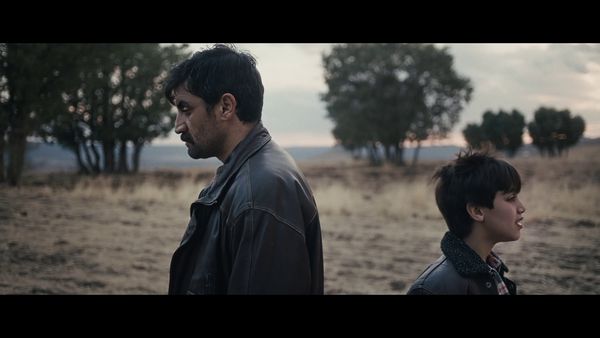Eye For Film >> Movies >> When The Walnut Leaves Turn Yellow (2024) Film Review
When The Walnut Leaves Turn Yellow
Reviewed by: Amber Wilkinson

The multiple pressures faced by a rural Kurdish community in Turkey are explored through the prism of a family in Mehmet Ali Konar’s tense and poignant drama. Ciwan (Korkmaz Aslan) has become a reluctant village chief - a duty others promise he will be relieved of come late autumn, when the leaves of the film’s title start to change.
There are few things in cinema that act as a better signpost to problems than a character coughing and, sure enough, Ciwan’s is an indicator of a terminal illness that he is shielding from his wife Fate and two children. His limited time, however, is a spur to taking his 14-year-old son Feyzi (played with a wide-eyed innocence by Heval Naif) on all of his errands, so that he gets a feel for the complex politics at work in their small area of the world.
On the one hand are the Turkish government, represented by an unpleasant Army captain, while on the other are the PKK militants, with neither side caring for the everyday stresses and strains of the farming community Ciwan is part of.
Konar’s set-up doesn’t give much context for a non-Turkish audience, immersing us immediately within the world of unspoken conflict, which does mean some patience and brainwork is required to figure out the political machinations. The film, which played at the International Crime And Punishment Film Festival in Istanbul this week, could be made a lot more accessible to international audiences with even an initial intertitle offering a brief overview.
The family focus, however, helps to anchor the film in more universal concerns of a father trying to protect his heritage and pass it down the line at the same time as his son is facing choices that could prove deadly. Konar indicates these choices are not evenly weighted, however, with some options being as much thrust upon the young as deliberately selected.
Aslan brings a soulful stoicism to Ciwan as he tries to steer one of the other youngsters in the village away from trouble and his performance dovetails well with Haif’s turn as a young man contemplating rebellion against his father at the same time as trying to understand the wider landscape of his life. Konar has a measured shooting style that favours naturalism, and often adopts the engaging Dardennes’ brothers trick of following protagonists as they go about their business, giving a sense of movement. There is also a reliance on ambient sound rather than score, which helps give the film a strong sense of place. For all its naturalism, there are also cleverly worked dream sequences and spiritual encounters that offer a more psychological dimension.
The tensions between Ciwan and his son Feyzi come to the fore as the youngster questions the value of mucking out the cows and continuing this life. When Feyzi asks about farm work versus schoolwork, his father insists he should “do both”. This idea of having to chart different directions simultaneously in order to stay on the right side of all the forces at play, runs through a drama where one false step has the potential to spark tragedy. Konar also powerfully shows how repression can fuel unexpected violence. When choices are limited and the world unjust, the writer/director suggests it can come to be seen as the only option.
Reviewed on: 27 Nov 2024














